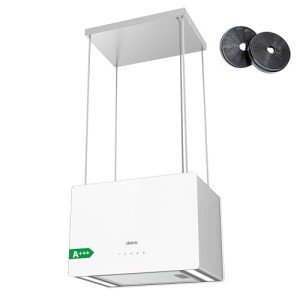The No. Question That Everyone In Island Extractors Should Be Able Ans…
페이지 정보

본문

Island Extractors: A Comprehensive Guide to a Unique Industry
In the realm of extraction markets, few sectors record the imagination as strongly as that of island extractors. These specialized entities concentrate on the extraction of important resources, both renewable and non-renewable, from island communities. This article looks into the multifaceted world of island extractors, discussing their operations, environmental effects, and the future of this specific niche market.
Understanding Island Extraction
Island extractors are companies or people that participate in the extraction of natural deposits located on islands. This extraction can include a range hood for island of materials, such as minerals, fossil fuels, and even marine resources. Provided the unique ecosystems found on islands, the extraction procedure can provide both chances and fundamental difficulties.

Classifications of Island Extraction
Island extraction can normally be categorized into a number of classifications:
| Category | Description | Examples |
|---|---|---|
| Mineral Extraction | The elimination of minerals from the earth | Kaolin, Bauxite, Iron Ore |
| Nonrenewable Fuel Source Extraction | Extraction of fuels formed from raw material over millennia | Oil, Natural Gas |
| Marine Resource Extraction | Gathering resources from oceanic environments | Fish, Seaweed, Shellfish |
| Eco-friendly Resource Extraction | Extraction of sustainable resources | Wood, Freshwater |
The Process of Island Extraction
The extraction process itself can differ significantly based on the resource in concern. The treatments for drawing out oil diametrically vary from those for gathering seafood.
Steps in the Extraction Process
- Exploration: This phase involves geological studies and preliminary studies to evaluate the capacity of the resource.
- Laws Compliance: Compliance with regional and Island Cooker hoods 60cm international environmental laws is crucial to guarantee sustainable practices.
- Extraction: This includes drilling for oil or mining for minerals, and can cause considerable disruption to local communities if not handled effectively.
- Transportation: Extracted resources normally need transportation back to the mainland or other markets, frequently involving the usage of ships and barges.
- Post-Extraction Restoration: Efforts to restore the environment post-extraction are important to mitigate lasting effects.
Environmental Impact of Island Extraction
Provided the fragile nature of island cooker hood ecosystems, the environmental impact of extraction activities can be considerable.
Key Environmental Concerns
- Environment Destruction: The physical elimination of landscapes can ravage regional flora and animals.
- Contamination: Resource extraction can present toxins, leading to ocean acidification, water contamination, and air quality degradation.
- Coastal Erosion: Activities can worsen coastal disintegration, changing the natural landscape and affecting local communities.
- Biodiversity Loss: Extractors often disrupt local communities, placing native species at risk.
Mitigation Measures
To combat these effects, island extractors are increasingly adopting sustainable practices that include:
- Implementing stricter ecological guidelines
- Using innovation for much safer extraction procedures
- Conducting thorough ecological impact evaluations (EIA)
- Engaging with local communities throughout planning and operation stages
The Future of Island Extraction
As worldwide need continues to rise for natural deposits, the future of island extractors appears appealing yet complex. Several aspects will form the trajectory of this market in coming years:
- Technological Advancements: Innovations in extraction technology might result in more effective and less ecologically disruptive techniques.
- Regulatory Changes: As climate modification ends up being an ever-pressing problem, stricter guidelines might redefine extraction practices, prioritizing sustainability.
- Pressure from Environmental Groups: Increased advocacy for the defense of biodiversity and environments can influence operational protocols.
- Shift towards Renewable Resources: A growing focus on renewable resource services may change the focus from non-renewable extraction to sustainable practices.
Frequently Asked Questions
What resources are commonly extracted from islands?
Typical resources drawn out from islands consist of minerals, fossil fuels, timber, freshwater, and marine resources such as fish and seaweed.
How do island extractors make sure sustainability?
Island extractors can guarantee sustainability by adhering to environmental policies, including technology that decreases effect, and bring back environments post-extraction.
What are the major obstacles faced by island extractors?
Challenges consist of compliance with regulations, managing environmental effects, logistical concerns related to transport, and engaging with regional neighborhoods impacted by extraction.
Are there any notable island extraction tasks?
Yes, different tasks exist globally, consisting of mineral mining in the Caribbean, oil drilling in the North Sea, and sustainable fish farming initiatives in Southeast Asia.
The world of island extractors is a complex interaction between economic chance and environmental obligation. As this market evolves, the obstacle will be to stabilize resource extraction with the requirement to secure fragile island cooker communities. By accepting sustainable practices and engaging with regional neighborhoods, island Cooker Hoods 60Cm extractors can forge a path that respects both nature and market, ensuring that these special environments are preserved for generations to come.
- 이전글Nine Things That Your Parent Taught You About Duel Fuel Range Cookers 25.05.19
- 다음글Don't Make This Silly Mistake On Your Built In Oven And Microwave 25.05.19
댓글목록
등록된 댓글이 없습니다.

